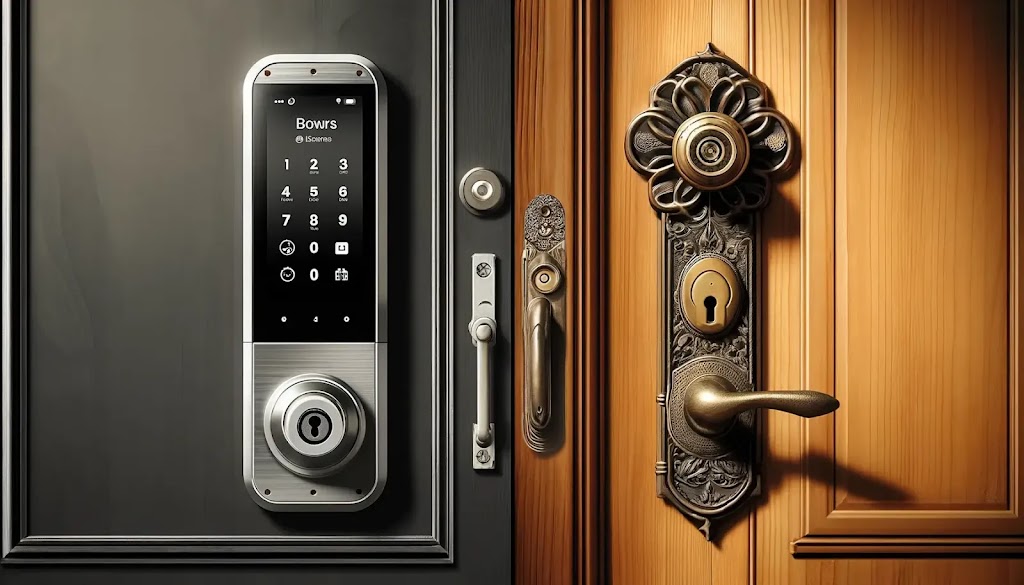What Are Smart Locks?
The smart locking system operates as an electronic entry system accessible from mobile devices with smartphone or tablet connections as well as other connected electronic devices. The technology offers users alternative entry options that can combine keypads with biometric recognition systems and smart home system connectivity. Customers often choose products from these three brands: August, Schlage Encode, and Yale Assure.
Key Features of Smart Locks:
- Remote control via mobile apps.
- Smart locks feature keyless entry by using PIN codes as well as fingerprints and voice commands.
- Integration with smart home ecosystems like Amazon Alexa, Google Assistant, or Apple HomeKit.
- The feature records who comes in or leaves your house through its monitoring system.
- Your smart device allows setup of short-term entry codes that can be edited or modified for invited visitors.
What Are Traditional Locks?
Traditional locks exist as mechanical locking systems which have persevered since the ancient times. Traditional locks function only by way of physical keys to manage door entering or exiting functions. Traditional locks manifest as deadbolts alongside knob locks and mortise locks.
Key Features of Traditional Locks:
- Simple design with no reliance on electricity or internet connectivity.
- Traditional locks demonstrate stable reliability throughout countless years of proven usage.
- Widely available and affordable.
- Easy to install and maintain.
Comparison: Smart Locks vs. Traditional Locks
| Feature | Smart Locks | Traditional Locks |
|---|---|---|
| Convenience | Remote access, no need for physical keys. | Requires carrying and managing physical keys. |
| Security Features | Advanced features like biometrics and activity logs. | Strong physical security but lacks advanced features. |
| Installation | May require professional installation and setup. | Simple DIY installation in most cases. |
| Power/Connectivity | Requires batteries or a power source; internet-dependent. | No power or internet required. |
| Cost | Generally more expensive upfront. | Affordable and budget-friendly. |
| Maintenance | Battery replacements and software updates needed. | Minimal maintenance beyond key duplication. |
Advantages of Smart Locks
- Convenience: Your smart lock connects to your control system allowing guest entry by adding temporary authorizations without key concerns.
- Enhanced Security: Most smart locks today offer tamper alert detection alongside automatic deadbolt engagement features and systems that require two authentication steps to open the door.
- Integration: The system allows users to connect other connected home devices to automate their home additional devices seamlessly.
Advantages of Traditional Locks
- Reliability: Such locks operate independently of power and internet thus remaining secure from both power failures and cyberattacks.
- Affordability: At a lower cost smart locks lag behind traditional locks because they require significantly more investment.
- Ease of Use: It only takes a key because traditional locks function without requiring expertise in technology or special equipment of any kind.
Potential Drawbacks
Smart Locks:
- The system faces security risks unless it receives adequate security measures.
- Dependence on power and internet connectivity.
- Higher upfront and maintenance costs.
Traditional Locks:
- Lock keys have the risk of disappearing through unintended use along with the potential for theft and duplication.
- The variety of modern smart lock capabilities exceeds what traditional locks provide.
- These locks lack both remote access methods and any monitoring functions.
Which Is Right for You?
Choose Smart Locks If:
- enarios where convenient access from any location becomes essential for you.
- Your home has a smart system installed now or if you plan to establish one in the future.
- Many users must give rolling access to different people.
Choose Traditional Locks If:
- You want basic yet robust security without relying on energy or connection to the internet.
- Your budget needs a low-cost system for home security.
- The security technology for your home makes you feel uncomfortable.
The Best of Both Worlds
Final Thoughts
Selectable between smart locks and traditional locks depends on what lifestyle you want alongside your budgetary constraints alongside security requirements. The comparison between various security systems will help you establish secure home protection through a calculated choice.
Check back often on Home Security Insider for all your home security insights and product reviews and helpful tips.

